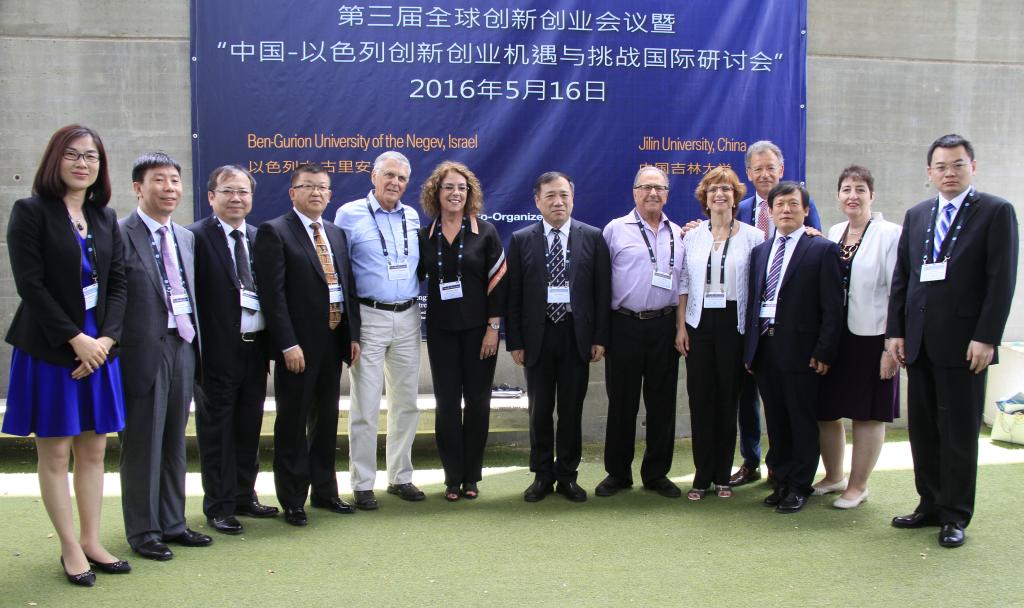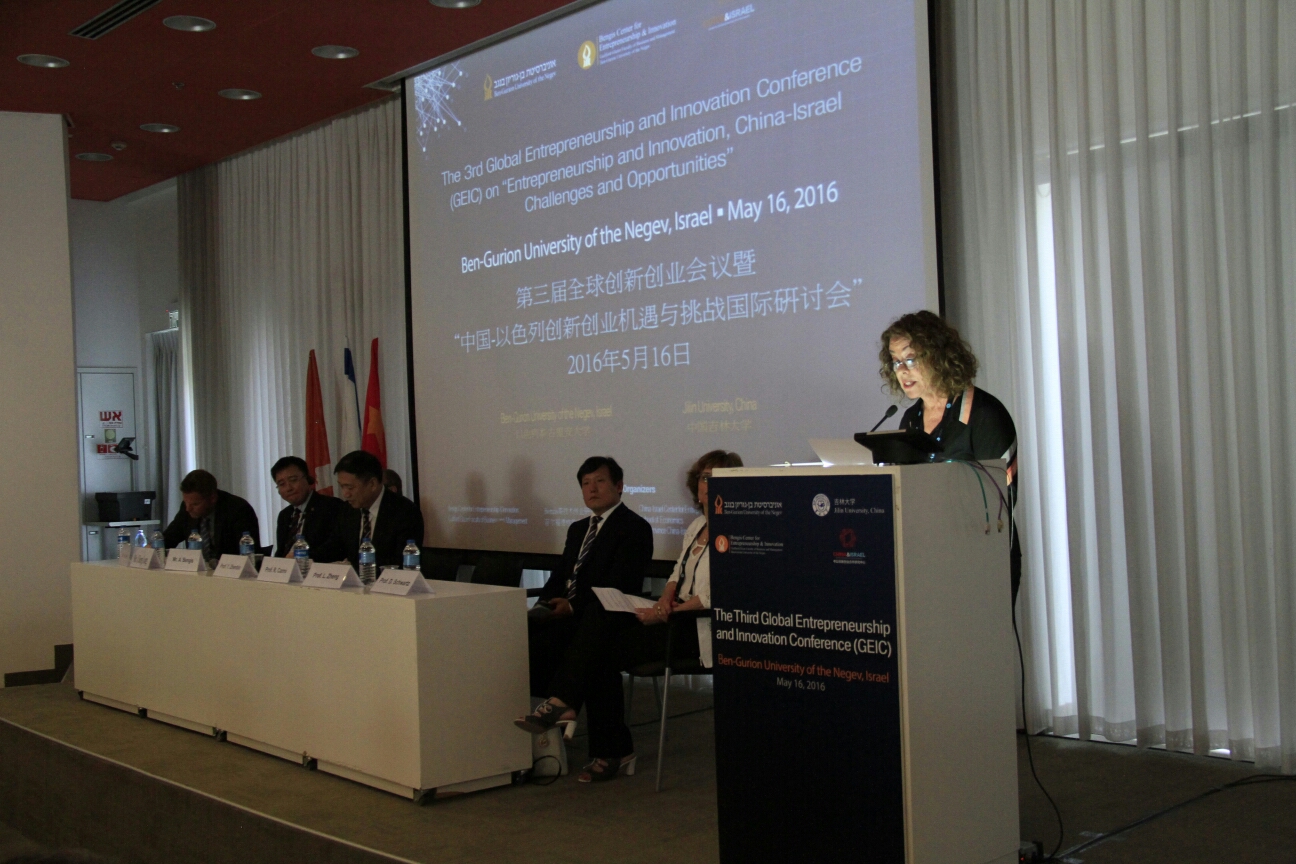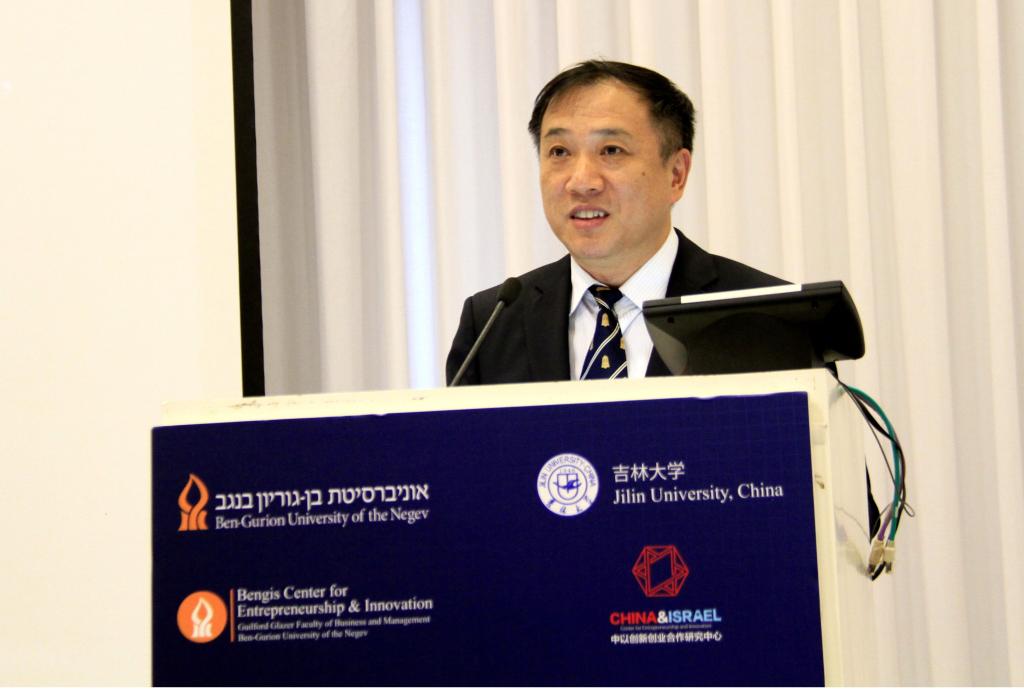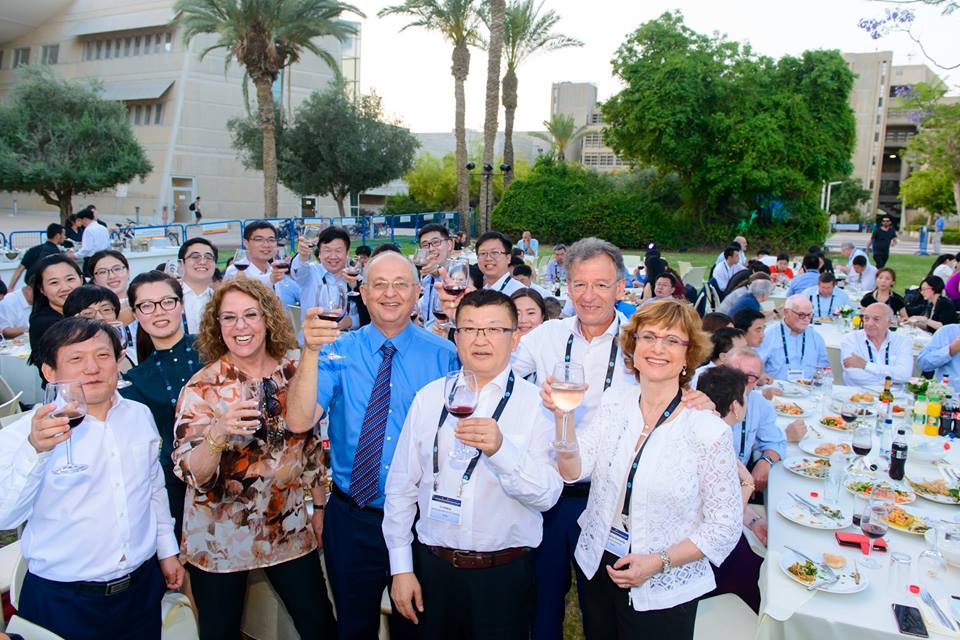
The Third Global Entrepreneurship and Innovation Conference (GEIC) took place this week at BGU. It was the first such conference to take place outside of China, and is a joint collaboration between BGU and Jilin University (JLU), the largest in China.
The two formed a joint entrepreneurship and innovation center last month. The joint center is operated by the universities’ two innovation centers: the Bengis Center for Entrepreneurship and Innovation of the Guilford Glazer Faculty of Business and Management at BGU and the China-Israel Center for Entrepreneurship and Innovation in the Faculty of Economics at JLU.
The theme of this year's conference was “Entrepreneurship and Innovation, China-Israel – Challenges and Opportunities". “This is the first activity of the Joint Center JLU-BGU for entrepreneurship and Innovation,” said Prof. Dafna Schwartz, Chairperson of the Bengis Center who initiated the collaboration.
The Chinese delegation included 130 participants, including leading academics from Jilin University and other Chinese universities, government officials from the Jilin province , entrepreneurs and business people. On the Israeli side, the conference attracted about 300 participants, including leading academics and businesspeople. Arnold Bengis, founder of the Bengis Center for Entrepreneurship and Innovation, graced the conference with his presence.
“One of the unique things about this conference is the fact that the University is taking an active role in promoting business ties as part of its commitment to being an active player in the innovation ecosystem. The beginning of the collaboration between BGU and JLU began at a similar conference in China a year ago when we decided the two innovation and entrepreneurship centers should join forces. We hope that this conference, which included many opportunities for its participants to make new connections, will lead to additional significant collaborations between our two countries,” said Prof. Schwartz, in her opening remarks.
“A solid comprehensive relationship with China is one of the strategic goals of the State of Israel and of BGU’s. The people of both nations have much in common, not only our cultures of antiquity but also the great importance we both attribute to education and innovation,” declared BGU President Prof. Rivka Carmi (pictured below) in her greetings.

“The fit between JLU and BGU seems to be perfect as entrepreneurship and innovation are driving forces in both. Moreover, we both believe that by joining the forces of academia and the industry and business community, we provide a robust synergy that will enable excellence and growth. We are looking forward to a very active, extensive and fruitful collaboration with Jilin University and the province of Jilin and hope to further expand this cooperation to include other academic partners and those in the spheres of industry and business in China,” she said.
“The road to economic recovery is bumpy and twisty,” said Prof. Yang Zhenbin (pictured below), Chairman of the University Council, JLU, “Yet, while global trade is shrinking, bilateral trade [between China and Israel] has increased. A new era of technology and innovation is on the way. Israel is a global leader in agricultural technology, cleantech, military technology and venture capital, while China is a developing country with the largest potential market.”

China is Israel’s largest trading partner in Asia and third largest in the world, said Ran Peleg, Deputy Director of North East Asia Department, Ministry of Foreign Affairs. Last year, there was $10 billion in two-way trade. A Chinese airline has opened a thrice weekly route between China and Israel while a new 10 year visa agreement was just reached removing barriers to increasing trade and bilateral visits, he added.
A special moving video message from former President of Israel Shimon Peres was also screened in which he noted the similarities between China and Israel, “We started to work together and we are not the same size, but we are the same age. We are not the same story, but we have the same history and all people that have developed a beautiful culture, created a young republic that creates a new future.”

The secret to Israel’s success, he said was, “The wealth of each of the boys and the girls, the men and the women, have inside themselves, with enthusiasm, with devotion, with courage, with producing something new. And so from nothing we became all of a sudden a wealthy country, not with foreign money, not with donations, but the talent and devotion of the Israeli people.”
“I understand that the joint center that you are building at the universities, and I know that the two of them are great universities, is by trying to make the university not just a place of learning, but an occasion for entrepreneurship. What does it mean? Ben-Gurion said you know that all experts are experts for things that did happen. You don’t have experts for things that should happen or may happen. So you have really to orient yourself, not upon precedents but upon dreams,” Peres advised the audience. His message concluded to a round of applause from the audience.
Nobel Prize Laureate Prof. Dan Shechtman offered his recipe for creating technological entrepreneurs during his keynote address. Shechtman launched a class in technological entrepreneurship at the Technion – Israel Institute of Technology 30 years ago, which was an instantaneous hit. More than 800 students signed up for 600 slots. Shechtman treated the audience to an amusing and comprehensive analysis of what entrepreneurs need to do to succeed.
Mr. Avi Hasson, the Chief Scientist of the Israeli Ministry of Economy and Industry, reiterated that the Israeli government’s policy was to assume most of the risk for startups by offering a variety of programs to support budding entrepreneurs. “Our job is to create an environment in which the best ideas will succeed,” he said. “In 2016 it doesn’t matter how big you are. You won’t succeed unless you build collaborative bridges to outside partners. These bridges enable innovation to stream into the system,” he contended.
“50% of Israel’s exports are based on hi-tech, but only 10% of the workforce work in the field. We need more people in this game, and therefore we are actively searching for ways to bring in more populations like the Arabs and the Haredim,” Hasson said.
Prof. Tsvi Vinig of the University of Amsterdam who made the connection between BGU and JLU in the first place congratulated both universities on the start of the collaboration. Mr. Cheng Long, Chairman of the Federation of Youth of Jilin Province also offered his congratulations.
Prof. Li Zheng Deputy Dean of the School of Economics and the founding director of the China-Israel Center for Entrepreneurship and Innovation at JLU presented the main activities the joint center is planning for the future.
The second part of the conference featured a number of parallel academic and business sessions as well as a gala dinner.
Both the business session as well as the academic session started with a plenary session, and then split up into parallel sessions.
The academic session, led by Prof. Rafi Bar-El, split into two sessions featuring presentations of research papers on the topic of innovation and entrepreneurship by researchers from China, Israel and other countries. A special panel of deans from both sides explored potential collaborations in various areas.
The business session led by Prof. Dafna Schwartz split into three business sessions, featuring innovative business models relating to specific topics of interest to both the Chinese and Israeli participants: Innovation in Health Services, led by: Mr. Ziv Ofek, founder and CEO of CDI; China-Israel Collaboration, Past Experience and Future Potential, led by Nir Dagan, Co-Founder, Managing Partner and Chief Executive Officer of SkyFund; Prof. Moti Herskowitz, Director, Blechner Center for Industrial Catalysis & Process Development, BGU. Avi Feldman, CEO of Capital Nature organized a special panel on cleantech.
The conference was just the start of an exciting collaboration, says Prof. Schwartz.


